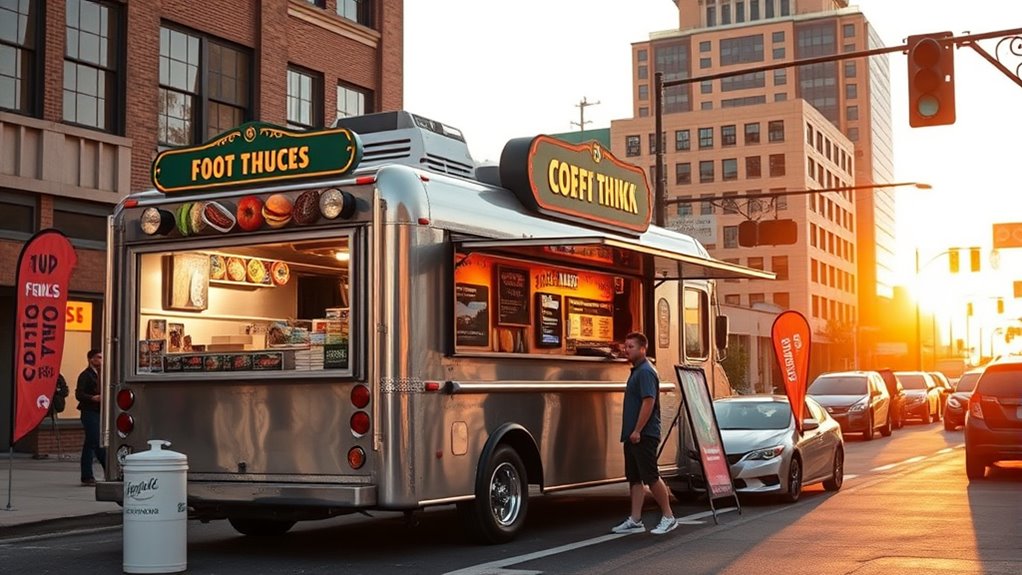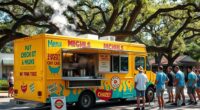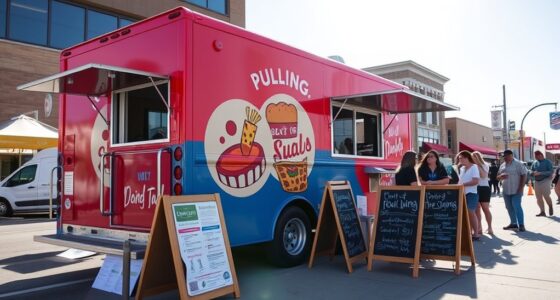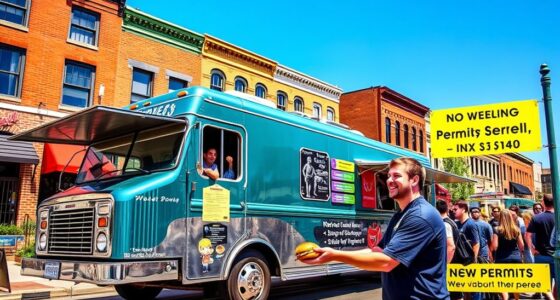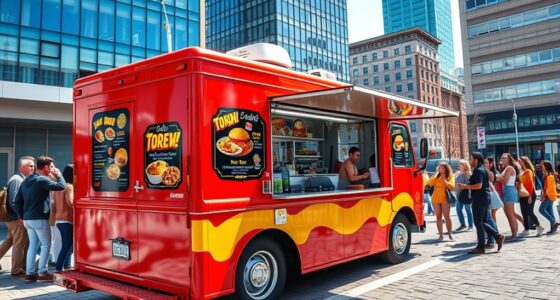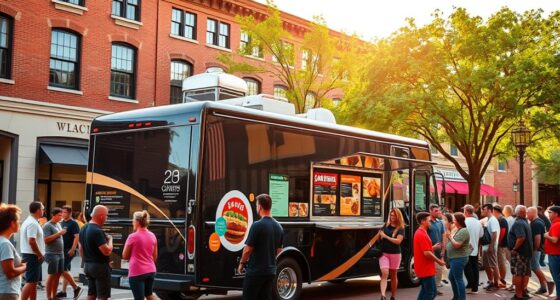To open a food truck in Fort Wayne, you’ll need permits like a Mobile Food Vendor Permit and Health Permit, with costs around $325–$375. Confirm compliance with fire safety and health regulations, and select locations that follow zoning laws. Develop a simple, appealing menu that meets safety standards and plan marketing using social media and local events. Staying compliant and strategic will set you up for success; learn more to start your business confidently.
Key Takeaways
- Obtain necessary permits including Mobile Food Vendor, Health, and fire safety permits, and ensure compliance with zoning laws.
- Budget $325-$375 for permits, equipment, location fees, and marketing to manage operational costs effectively.
- Select compliant locations with high foot traffic, avoiding restricted areas like parks and residential zones.
- Develop a simple, safe menu aligned with Indiana Food Code, sourcing ingredients from approved suppliers.
- Promote your food truck via social media, participate in local events, and build community partnerships for growth.
Navigating Permit Requirements and Fees in Fort Wayne
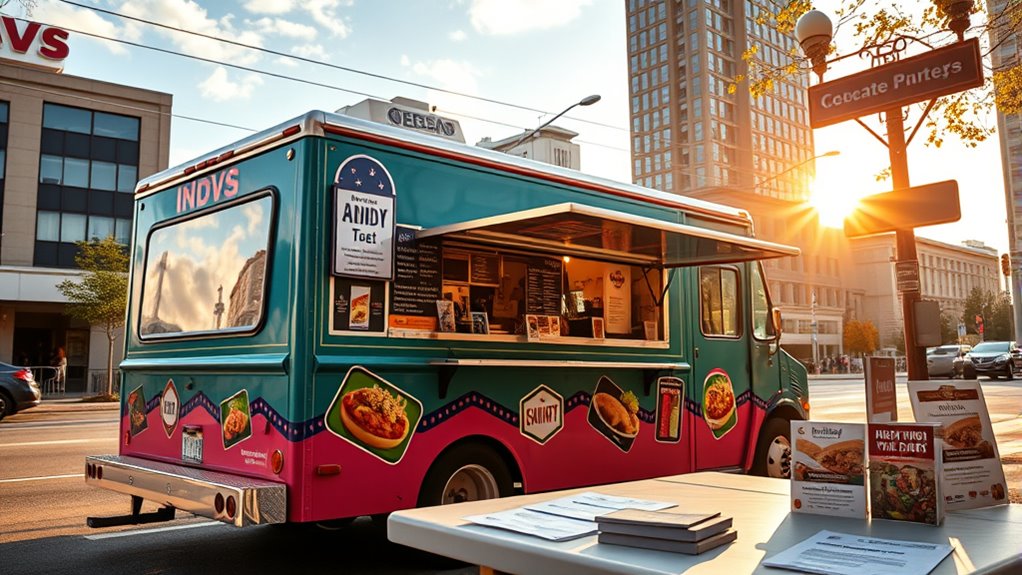
Guiding permit requirements and fees in Fort Wayne is a straightforward process if you understand the necessary steps. First, you’ll need to submit a completed Mobile Food Vendor Permit application to the Fort Wayne City Clerk’s Office. This permit must be visibly displayed on your truck during operation and renewed annually to stay valid. The permit covers your full mobile vending operations within city limits and requires compliance with zoning and parking rules. Additionally, you must obtain a Health Permit from the Fort Wayne-Allen County Health Department, pass an annual health inspection, and complete a Food Protection Manager Certification Course. If you use cooking equipment, you’ll also need a Fire Safety Permit, including inspections for fire extinguishers and suppression systems. Expect application fees ranging from $325 to $375, supporting city inspections and enforcement. Understanding local zodiac sign compatibility can also improve your community relationships and customer interactions.
Ensuring Compliance With Food Safety and Fire Regulations
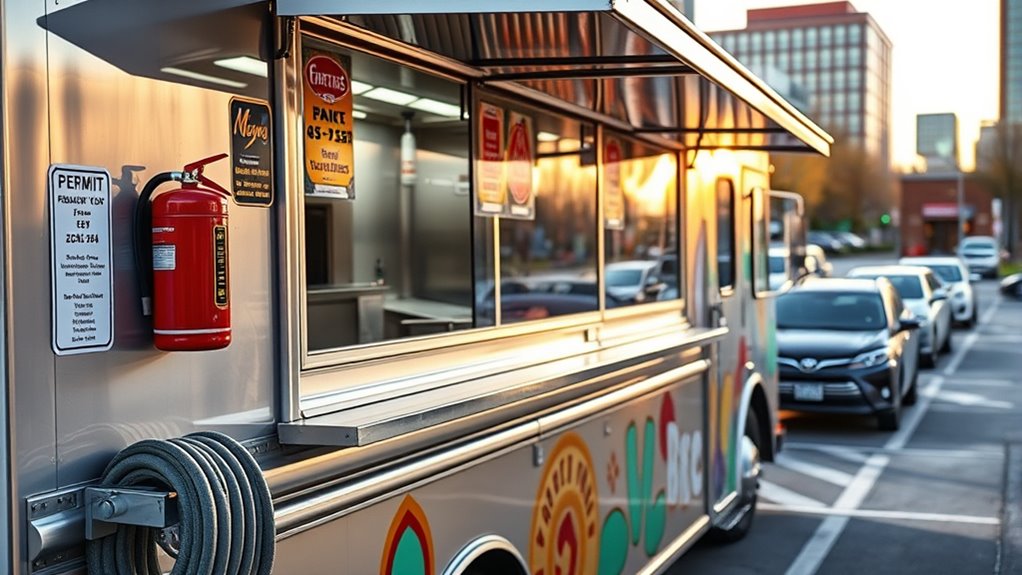
To guarantee your food truck remains compliant with local safety standards, you must prioritize proper fire safety measures and food handling practices. Ensure your fire extinguishers are mounted, tagged, and maintained annually by a licensed fire protection company—at least a 10 lb. ABC extinguisher, plus a Class K if cooking inside. Keep extinguishers accessible during business hours. For cooking equipment, install a Type I hood with an automatic fire suppression system, inspected yearly. Conduct regular cleaning of vents and grease traps. Schedule annual fire inspections with the Fort Wayne Fire Department, and have a Fire Prevention Bureau sign off your Food Establishment Sign-Off Sheet. Proper storage of propane tanks, adherence to electrical codes, and no fueling during operation are vital for safety and compliance. Additionally, implementing fire suppression systems that are properly maintained can greatly reduce fire risks associated with cooking equipment.
Choosing Prime Locations and Understanding Zoning Laws
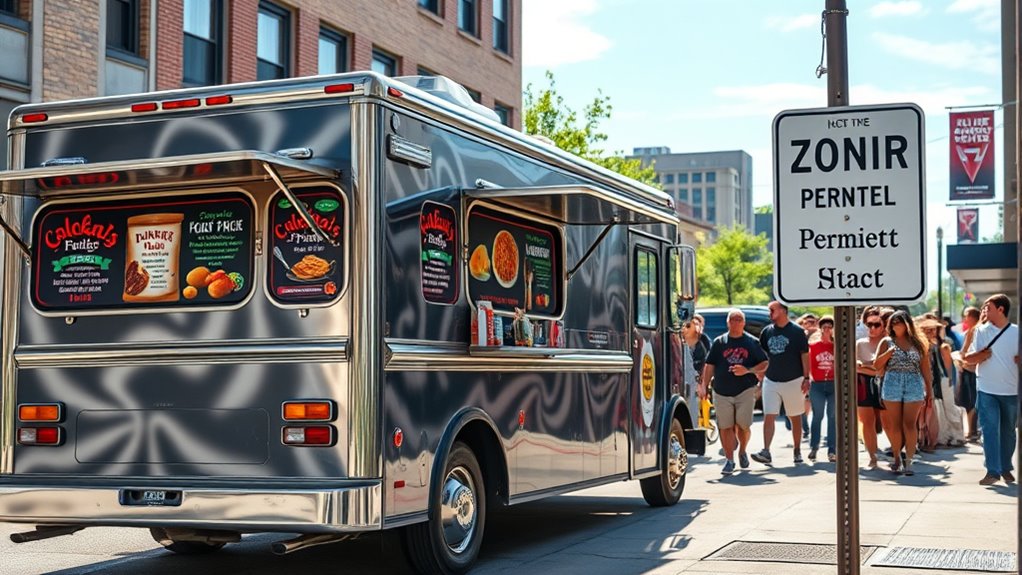
Choosing the right location for your food truck is essential for attracting customers and ensuring smooth operations, but it requires understanding Fort Wayne’s zoning laws. These laws restrict where you can operate, especially in parks, residential areas, and historic districts without special permits. You’ll need to verify if your target spot is zoned for commercial use and obtain the necessary permits, which often involve inspections and approvals. Operating without compliance can lead to fines or forced relocation. Navigating local regulations is crucial to avoid legal issues and establish a successful presence in the community. Additionally, being aware of tiny house regulations can help you better understand the importance of researching local laws to ensure compliance.
Here’s a quick overview of restrictions:
| Allowed Areas | Restrictions |
|---|---|
| Downtown, business districts | Need permits for city property or public spaces |
| Private properties | Owner permission required |
| Event venues, festivals | Temporary permits needed |
| Public parks | Special event permits required |
Crafting a Menu That Meets Local Guidelines
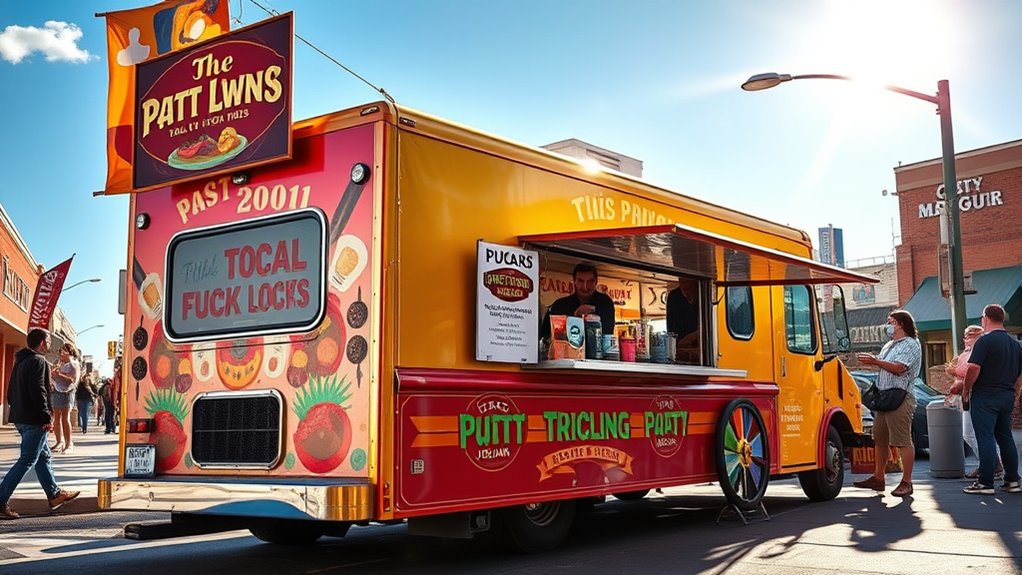
Creating a menu that complies with local health regulations guarantees your food truck operates smoothly and passes inspections. You must follow the Indiana Food Code and Allen County Department of Health standards, sourcing ingredients from approved suppliers. Make sure foods requiring temperature controls are served at regulated hot or cold temperatures. Your menu design should match your truck’s equipment capabilities, allowing safe preparation, cooking, and storage. Include allergen labeling and ingredient transparency to meet safety and inspection requirements. Also, consider fire safety regulations—use compliant cooking appliances with proper ventilation and fire suppression systems. Keep menu documentation ready, detailing sourcing and preparation methods. By aligning your menu with these guidelines, you’ll maintain compliance, ensure customer safety, and set your food truck up for success in Fort Wayne. Additionally, understanding the contrast ratio of your equipment can improve the visual presentation of your menu displays and signage, making them more appealing to customers.
Developing a Marketing Strategy to Attract Customers
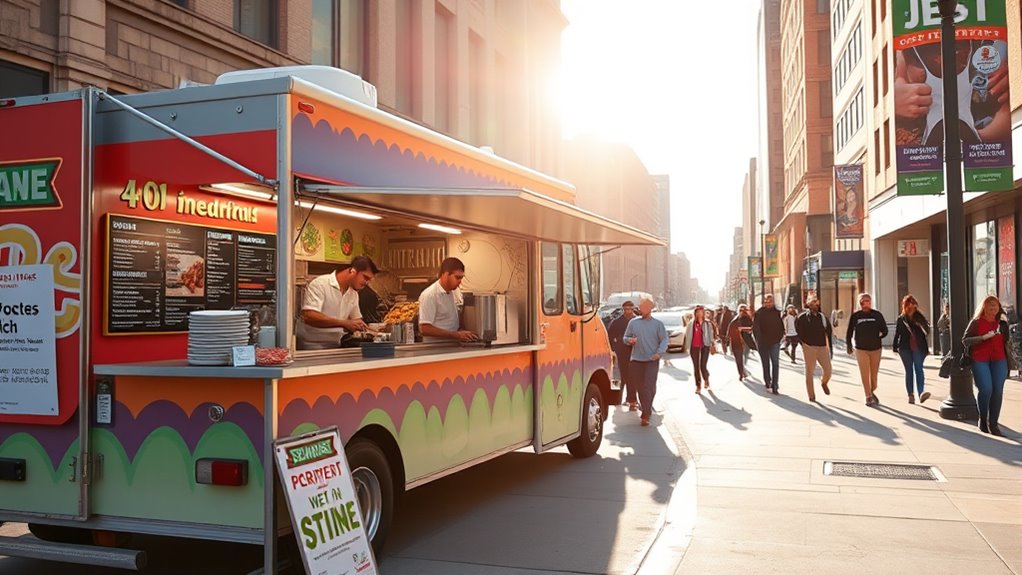
To attract more customers, you need a strong marketing plan that leverages social media and location strategies. Use platforms like Instagram and Facebook to share real-time updates, photos, and customer interactions that boost your visibility. Additionally, promoting your truck’s location and special events on apps and local networks keeps customers engaged and coming back. Consistent online engagement helps build a loyal customer base and keeps your truck top of mind in the community. Incorporating vertical storage solutions in your marketing materials can also highlight your commitment to organization and efficiency, appealing to customers who appreciate well-managed and clean food trucks.
Social Media Engagement Strategies
Effective social media engagement is essential for attracting customers to your food truck in Fort Wayne. Focus on platforms where your target audience is most active, like Instagram, Facebook, Twitter, and TikTok. Use Instagram for eye-catching food photos and behind-the-scenes content. Twitter helps share real-time updates on locations and menu changes. Consistency across platforms builds a strong brand identity. Incorporate hashtags and geo-tags to boost organic reach. Post daily with food shots, videos, and stories, and use polls or giveaways to encourage participation. Collaborate with local influencers to expand your reach and host takeovers for fresh content. Use geo-targeted ads to attract nearby customers with special offers. Here’s a quick guide:
| Platform | Content Focus | Engagement Tactics |
|---|---|---|
| Food photos & stories | Hashtags & behind-the-scenes | |
| Location updates | Real-time engagement & geo-tags | |
| TikTok | Short videos | Challenges & influencer collabs |
Building a consistent posting schedule and analyzing engagement metrics can help refine your strategy over time.
Location and Event Promotions
Strategic location and event promotions are key to attracting customers to your food truck in Fort Wayne. Leverage local food truck associations like Fort Wayne Food Trucks, Inc., which organize events, share calendars, and promote cross-collaboration. Participating in their monthly listings and social media channels with over 20,000 followers boosts your visibility and helps you connect with event organizers. Choose high-traffic locations such as downtown or parks, and attend popular festivals and city-sanctioned events to maximize exposure. Make sure you comply with zoning and permit requirements to operate legally. Collaborate with event organizers for private catering or sponsored events, and partner with nearby businesses for joint promotions. Implementing a targeted marketing plan these efforts create more foot traffic, build community support, and drive sales. Additionally, understanding cost and budgeting can help you allocate funds efficiently for location fees, permits, and promotional activities to ensure a successful launch.
Tips for Launching and Growing Your Food Truck Business
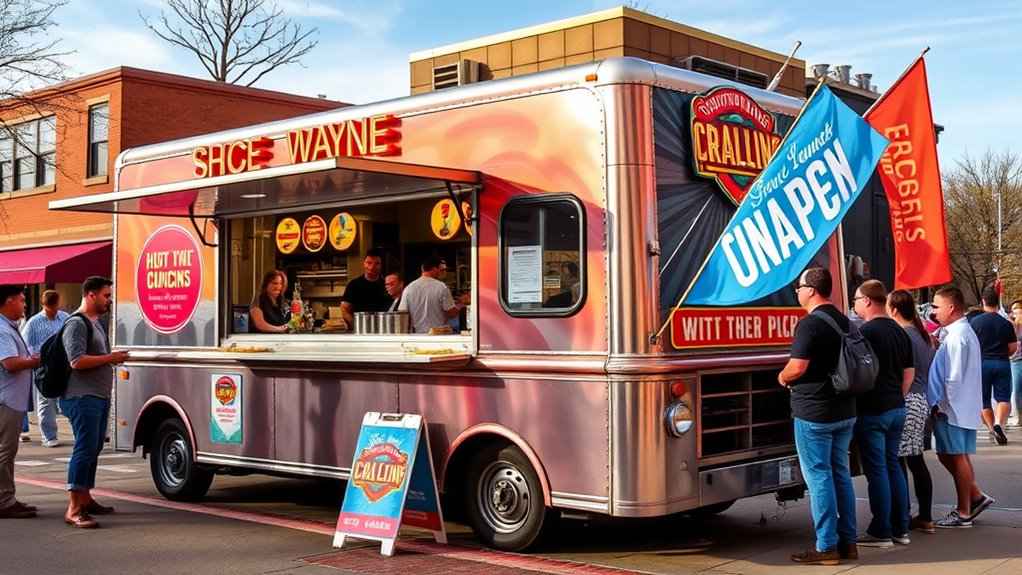
Launching and growing your food truck business in Fort Wayne requires careful planning and attention to local regulations. First, make certain you obtain the Mobile Food Vendor Permit and complete the Food Protection Manager Certification. Regular health and fire safety inspections are mandatory, especially if cooking is involved. Use the following table to guide your equipment and compliance needs:
| Equipment & Safety | Location & Hours | Menu Development |
|---|---|---|
| Install hood & extinguishers | Choose zoning-friendly spots | Focus on quick, local foods |
| Maintain sanitation | Operate 7 a.m. – 10 p.m. | Use seasonal ingredients |
| Schedule safety checks | Avoid restricted areas | Update menu based on feedback |
| Ensure proper sanitation | Negotiate prime spots | Keep menu simple & profitable |
Stay compliant, adapt to customer preferences, and leverage local events for growth. Understanding licensing and permits is crucial to avoid legal issues and ensure a smooth operation.
Frequently Asked Questions
Are There Any Specific Restrictions on Operating Hours for Food Trucks in Fort Wayne?
You should be aware that Fort Wayne has specific restrictions on operating hours for food trucks. Generally, you can operate from 7 a.m. to 10 p.m., but ice cream trucks face additional rules, like not vending before 9 a.m., during 5 p.m. to 6 p.m., or after dusk. You’ll need permits, and your hours must comply with zoning, safety, and location regulations to stay legal and avoid penalties.
What Are the Renewal Requirements for the Mobile Food Vendor Permit Annually?
Did you know that keeping your mobile food vendor permit active requires more than just paying a fee? Each year, you must renew your permit by submitting an updated application, passing health and fire safety inspections, and showing proof of certifications like Food Protection Manager and Food Handler. Make sure your fire extinguisher tags are current, and all documentation is up-to-date to avoid permit lapses and stay compliant.
Can Food Trucks Operate in Private Parking Lots Without Additional Permits?
You can’t just operate in a private parking lot without extra permits. Even with property owner approval, you need a Mobile Food Vendor Permit from Fort Wayne and health and fire safety permits. Zoning laws also matter; the lot must be zoned for commercial use. Failing to get these can lead to fines, legal trouble, or shutdowns, so always check local regulations and obtain the necessary permits before vending.
Are There Restrictions on Serving Alcohol From a Food Truck in Fort Wayne?
Serving alcohol from your food truck in Fort Wayne is like walking a tightrope—you need permits to stay balanced. You must obtain an alcohol license from the Indiana Alcohol and Tobacco Commission, and local regulations also apply. Public parks generally prohibit alcohol unless you have a special permit for certain venues. Remember, serving alcohol without proper licensing can lead to hefty fines or even shutdown, so always play by the rules.
How Does Weather Impact Food Truck Operating Permits and Location Choices?
Weather directly affects your food truck permits and location choices. Severe conditions like storms or heavy snow can delay permit approvals or lead to restrictions, especially in outdoor areas. You’ll want to select sheltered locations to avoid weather-related hazards, such as flooding or high winds. Additionally, you should plan for increased costs like heating or snow removal, and adjust your operating schedule based on seasonal weather patterns to keep your business running smoothly.
Conclusion
Starting your food truck in Fort Wayne can be a rewarding venture if you follow the right permits, location choices, and marketing strategies. Think of it like planting a seed—when you nurture your business with proper regulations and creative flair, it grows. Just as a well-watered plant blossoms, your food truck will thrive by staying compliant and engaging your community. With dedication, your food truck can become a beloved part of Fort Wayne’s vibrant food scene.
